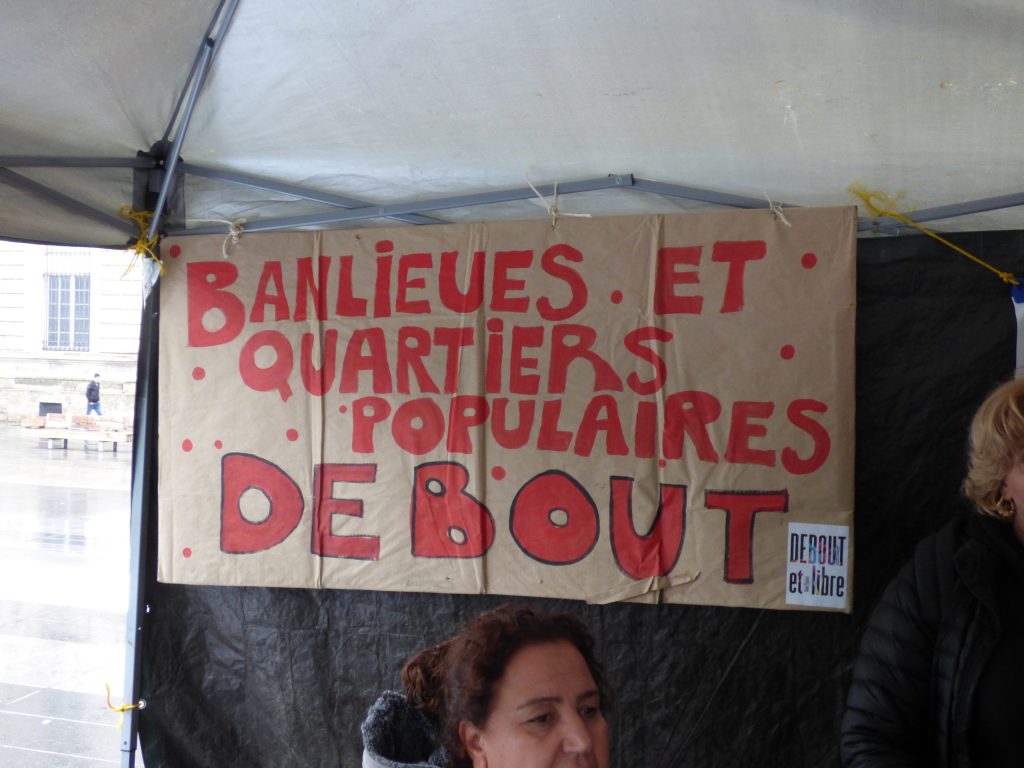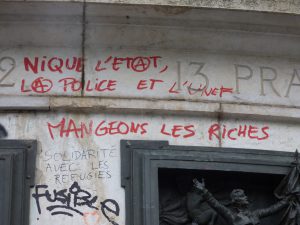El Errante
My decision to travel to Europe was taken lackadaisically. There had been some indications that nation-states on the Continent were being stressed from a number of different directions. First, the movement of upwards of two million refugees from the Middle East, specifically Syria, through the social-democratic European heartland is challenging the legitimacy of both the economic and security structures of numerous states. It should be noted that the dual nature of the stress, on social redistribution schemes and border integrity, indicates that both ideological left and right are being drawn into the legitimacy maelstrom, and that the moment of the challenge, its core, is situated to call into question not just the nation-state or Capital, rather they illuminate the failure of the entire Western liberal hegemon, the whole enchilada. So, I thought, why not? I feel like traveling and writing and the timing seemed somehow, perfect.
In spite of being detained and interrogated by two Homeland Security investigators at JFK, who proved to be far better informed about my trip to Rojava in October, international speaking tours, and what I had for breakfast (that day) than I thought was possible, I was eventually released and allowed to board my flight, though without the obligatory x-ray examination of my baggage. As I hunkered down into my seat on the first leg of the trip to Moscow via Aeroflot I reflected that it will likely be a long time before I return to the United States. I will not miss it.
The first two days in Paris were allotted to rest, visiting a few museums, sitting in cafes, and consuming copious (and potentially lethal) amounts of caffeine and baguette. Finally on Sunday I walked through spring fog and drizzle to the Place de la République to see what was happening with Nuit Debout. In the photos I had seen of the first few days of the occupations the Place (a rectangle of about two acres where a number of thoroughfares converge including Rue du Temple, Boulevard Voltaire, and Boulevard Saint-Martin) had been virtually overrun by thousands of people. On the day I visited there were perhaps a few hundred folks, most sheltered under a dozen or so blue tarps that had been set up at random to accommodate various collectives, Nuit Debout logistics and publicity coordinating groups, and the occasional alphabet soup Marxist Party propaganda committee. On the afternoon I stopped by most of these tents were being used for presentations on a range of topics. These included DIY carpentry, a  workshop on capitalism, “commune cause,” and a mini-assembly which appeared to be more about providing a venue for folks to vent than any specific debate or decision-making. At one tent a small YPG flag was set on a tabletop and as I circled outside I noticed that a smallish middle-aged woman was speaking and that questions would be translated for her and her responses were being translated for the listeners. I finally got a view of this presenter — and was not surprised to see that it was Janet Biehl; Murray Bookchin’s companion. I continued walking around for an hour or so, would stop and listen to a presenter and then move on.
workshop on capitalism, “commune cause,” and a mini-assembly which appeared to be more about providing a venue for folks to vent than any specific debate or decision-making. At one tent a small YPG flag was set on a tabletop and as I circled outside I noticed that a smallish middle-aged woman was speaking and that questions would be translated for her and her responses were being translated for the listeners. I finally got a view of this presenter — and was not surprised to see that it was Janet Biehl; Murray Bookchin’s companion. I continued walking around for an hour or so, would stop and listen to a presenter and then move on.
Finally, tired of the mist and rain, I made my way to the Fédération Anarchiste (FA) infoshop just off of République. It was, as usual, busy. The FA, a synthesist working class confederation, is one of the more stable anarchist organizations in France. Meaning that while the FA is an excellent point of contact for folks traveling in Europe, it also makes of the FA one of the targets for bullshit sectarian attacks. A sectarianism that in many ways exceeds the petty sniping, character assassination and trolling that the North American anarchist community once reveled in, but now appears to be putting aside.
One of the anarchists, Lou, that I had met on my way home from Rojava was there and he and I settled into the back of the infoshop and talked a little about the renewed social contestation in France. First off, he said, no one saw this coming. The French anarchist community had pretty much given up hope on any significant social contestation for decades to come. The proposal of the Loi du Travail and its effective  unleashing of employers to hire, fire and discipline, essentially at will, was less an attempt to revivify the French economy than it was a direct challenge to workers and their protection under law. The large reformist trade unions, like the CGT, missed their cue completely, and the attendant riots were essentially the coming together of three distinct groups, high school students, the anarchists and the autonomists. The first two are pretty obvious; the autonomists are a new quantity (for us) and require some discussion. This amorphous group first formed around the journal Tiqqun and the subsequent Invisible Committee. The autonomists then, like the nihilist communists, reject any descriptions of the society that they envision bringing into being. In many ways the autonomists are the logical extension of the Situationist International and while Marx isn’t mentioned in as explicit a fashion as the SI claimed him as their own, their use of the dialectic, and some aspects of Marxist teleology is apparent. This has not diminished their militancy, and they have refined street contestation and tactics into a virtual art. They have also sought to organize those sectors of society largely ignored by both unionists and anarchists, including high school students. They have also proven themselves to be savvy at the placement of their ideas within mainstream media outlets. This has had the effect of placing their critique within the larger framework of French political discourse, regardless of how radical it appears. It has also placed them beyond the narrow confines of the emergency laws instituted after the Charlie
unleashing of employers to hire, fire and discipline, essentially at will, was less an attempt to revivify the French economy than it was a direct challenge to workers and their protection under law. The large reformist trade unions, like the CGT, missed their cue completely, and the attendant riots were essentially the coming together of three distinct groups, high school students, the anarchists and the autonomists. The first two are pretty obvious; the autonomists are a new quantity (for us) and require some discussion. This amorphous group first formed around the journal Tiqqun and the subsequent Invisible Committee. The autonomists then, like the nihilist communists, reject any descriptions of the society that they envision bringing into being. In many ways the autonomists are the logical extension of the Situationist International and while Marx isn’t mentioned in as explicit a fashion as the SI claimed him as their own, their use of the dialectic, and some aspects of Marxist teleology is apparent. This has not diminished their militancy, and they have refined street contestation and tactics into a virtual art. They have also sought to organize those sectors of society largely ignored by both unionists and anarchists, including high school students. They have also proven themselves to be savvy at the placement of their ideas within mainstream media outlets. This has had the effect of placing their critique within the larger framework of French political discourse, regardless of how radical it appears. It has also placed them beyond the narrow confines of the emergency laws instituted after the Charlie  Hebdo attack and the ISIL bombing campaign. As an example the prosecution of the Tarnac 9 (the same group of folks who wrote The Coming Insurrection) never occurred, and probably never will. The acceptance (or at least acknowledgement) of the ideas of the autonomists among mainstream academics and theorists has removed them from the category of social villain that the anarchists and jihadis now inhabit almost exclusively. The formation and growth of autonomist organizations has also been rapid, and they have been fiercely competitive for members with larger more established organizations. As an example the French student union UNEF has had its membership raided by the autonomist high school organization MILI.
Hebdo attack and the ISIL bombing campaign. As an example the prosecution of the Tarnac 9 (the same group of folks who wrote The Coming Insurrection) never occurred, and probably never will. The acceptance (or at least acknowledgement) of the ideas of the autonomists among mainstream academics and theorists has removed them from the category of social villain that the anarchists and jihadis now inhabit almost exclusively. The formation and growth of autonomist organizations has also been rapid, and they have been fiercely competitive for members with larger more established organizations. As an example the French student union UNEF has had its membership raided by the autonomist high school organization MILI.
Finally, the autonomists are clear in distancing themselves from anarchism and the anarchists; in spite of some theoretical confluence, especially their critique of the dominant society and their understanding of insurrection. Which resembles some historical anarchist critiques (Stirner) and to a lesser degree recent anti-civilization theory.
The autonomists, the anarchists, and the high school students responded decisively to the proposed Loi du Travail, staging a number of ad hoc demonstrations. In the end, however, the filming of a student being beaten by the police galvanized the protestors and finally brought the unions, and everyone else, into the fray. Tensions have  risen dramatically since then, the legislation itself became law when the Chamber of Deputies employed a little used legal caveat that ended debate and allowed the legislative cowards to vote by not voting. Demonstrations have been ongoing, and Lou invited me to the next big manif, on Thursday, May 26th. I jumped at the chance and we made plans to meet prior to the march.
risen dramatically since then, the legislation itself became law when the Chamber of Deputies employed a little used legal caveat that ended debate and allowed the legislative cowards to vote by not voting. Demonstrations have been ongoing, and Lou invited me to the next big manif, on Thursday, May 26th. I jumped at the chance and we made plans to meet prior to the march.
(In the ensuing three days between meeting Lou and the manif the reformist union CGT struck at all eight oil refineries in France, and has also attempted to block entry to several of the nation’s nuclear power plants. Supplies of oil and gas have begun to dwindle, and as the CGT is the primary union for most of the transportation sector, their ability to pressure both the government and corporations into repealing the legislation will increase algorithmically.)
The next few weeks may prove decisive not only for the Loi du Travail, but for significant sectors of the economy, the political classes, and the population generally. The stress that the Syrian refugees are bringing to bear on European society seems to be matched, if not exceeded by, economic stagnation, emerging political authoritarianism, and what appears to be a restive, increasingly alienated citizenry. So the timing of the European trip was not bad. And timing, as we all know, is everything
